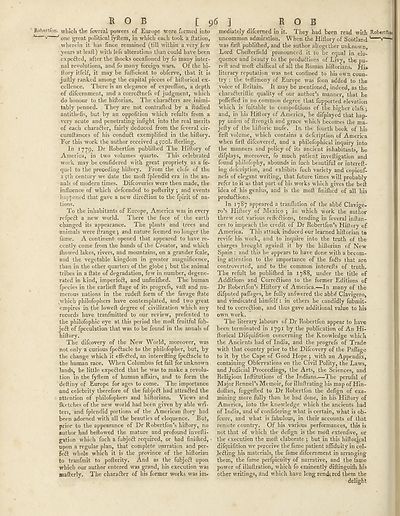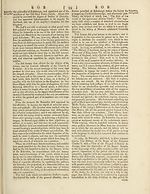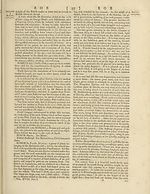Encyclopaedia Britannica, or, a Dictionary of arts, sciences, and miscellaneous literature : enlarged and improved. Illustrated with nearly six hundred engravings > Volume 18, RHI-SCR
(104) Page 96
Download files
Complete book:
Individual page:
Thumbnail gallery: Grid view | List view

HOB [ 96 ] ROB
Robertfon. which the feveral powers of Europe were formed into
one great political fyftem, in which each took a flation,
wherein it lias fince remained (till within a very few
years at lead) with lefs alterations than could have been
expected, after the thocks occafioned by fo many inter¬
nal revolutions, and fo many foreign wars. Of the hi-
Itory itfelf, it may be fufficient to obferve, that it is
juflly ranked among the capital pieces of hidorical ex¬
cellence. There is an elegance of expreflion, a depth
of difcernment, and a corre61nefs of judgment, which
do honour to the hiftorian. The chara&ers are inimi¬
tably penned. They are not contrafled by a flildied
antithefis, but by an oppofition which refults from a
very acute and penetrating infight into the real merits
of each charafter, fairly deduced from the feveral cir-
curaftances of his conduct exemplified in the hillory.
For this work the author received 4500I. fterling.
In 1779, Or Robertfon publilhed The Hiftory of
America, in two volumes quarto. This celebrated
work may be confidered with great propriety as a fe-
quel to the preceding hiftory. From the clofe of the
1 ijth century we date the moft fplendid era in the an¬
nals of modern times. Difcoveries were then made, the
influence of which defcended to pofterity ; and events
happened that gave a new diredlion to the fpirit of na¬
tions.
To the inhabitants of Europe, America was in every
refpetl a new world. There the face of the earth
changed its appearance. The plants and trees and
animals were ft range j and nature feemed no longer the
fame. A continent- opened that appeared to have re¬
cently come from the hands of the Creator, and which
Ihowed lakes, rivers, and mountains, on a grander fcale,
and the vegetable kingdom in greater magnificence,
than in the other quarters of the globe ; but the animal
tribes in a ftate of degradation, few in number, degene¬
rated in kind, imperfetft, and unfiniftied. The human
fpeeies in the earlieft ftage of its progrefs, vaft and nu¬
merous nations in the rudeft form of the favage ftale
(which philofophers have contemplated, and two great
empires in the loweft degree of civilization which any
records have tranfmitted to our review, prefented to
the philofophic eye at this period the moft fruitful fub-
je£l of fpeculation that was to be found in the annals of
hiftory.
The difcovery of the New World, moreover, was
not only a curious fpeftacle to the philofopher, but, by
the change which it effefted, an interefting fpe£facle to
the human race. When Columbus fet fail for unknown
lands, he little expe£ted that he was to make a revolu¬
tion in the fyftem of human affairs, and to form the
deftiny of Europe for ages to come. The importance
and celebrity therefore of the fubjeft had attra&ed the
attention of philofophers and hiftorians. Views and
Iketches of the new world had been given by able wri¬
ters, and fplendid portions of the American ftory had
been adorned with all the beauties of eloquence. But,
prior to the appearance of Dr Robertfon’s hiftory, no
author had beftowed the mature and profound invefti-
gation which fuch a fubjeft required, or had finithed,
upon a regular plan, that complete narration and per-
feft whole which It is the province of the hiftorian
to tranfmit to pofterity. And as the fubjeft upon
which our author entered was grand, his execution was
mafterly. The character of his former works was im*
mediately difeerned in it. They had been read with Rofcertfon
uncommon admiration. When the Hiftory of Scotland u--Y—-
was firft publiftied, and the author altogether unknown,
Lord Chefterfield pronounced it to be equal in elo¬
quence and beauty to the productions of Livy, the pu-
reft and moft claflical of all the Roman hiftorians. His
literary reputation was not confined to his own coun¬
try : the teftimony of Europe was foon added to the
voice of Britain. It may be mentioned, indeed, as the
charaCteriftic quality of our author’s manner, that he
poffeffed in no common degree that fupported elevation
which is fuitable to com'pofitions of the higher clafs ;
and, in his Hiftory of America, he difplayed that hap¬
py union of ftrength and grace which becomes the ma-
jefty of the hiftoric mule. In the fourth book of his
firft volume, which contains a defeription of America
when firft difeovered, and a philofophical inquiry into
the manners and policy of its ancient inhabitants, he
difplays, moreover, fo much patient inveftigation and
found philofophy, abounds in fuch beautiful or intereft¬
ing defeription, and exhibits fuch variety and copiouf-
nefs of elegant writing, that future times will probably
refer to it as that part of his works which gives the beft
idea of his genius, and is the moft finiftied of all his
produClions.
In 1787 appeared a tranflation of the abbe Clavige-
ro’s Hiftory of Mexico ; in which work the author
threw out various refleClions, tending in feveral inftan-
ces to impeach the credit of Dr Robertfon’s Hiftory of.
America. This attack induced our learned hiftorian to
revife his work, and to inquire into the truth of the
charges brought againft it by the hiftorian of New
Spain : and this he appears to have done with a becom¬
ing attention to the importance of the fa£!s that are.
controverted, and to the common interefts of truth.
The refult he publifhed in 1788, under the title of
Additions and Corredlions to the former Editions of
Dr Robertfon’s Hiftory of America.—-In many of the
difputed paffages, he fully anfvvered the abbe Clavigero,
and vindicated himfelf: in others he candidly fubmit-
ted to corre&ion, and thus gave additional value to his
own work.
The literary labours of Dr Robertfon appear to have
been terminated in 1791 by the publication of An Hi-
ftorical Difquifition concerning the Knowledge which
the Ancients had of India, and the progrefs of Trade
with that country prior to the Difcovery of the Paffage
to it by the Cape of Good Hope j with an Appendix,
containing Obfervations on the Civil Polity, the Laws,
and Judicial Proceedings, the Arts, the Sciences, and
Religious Inftitutions of the Indians.—The perufal of
Maj or Rennel’s Memoir, for illuftrating his map of Hin-
doftan, fuggefted to Dr Robertfon the defign of exa¬
mining more fully than he had done, in his Hiftory of
America, into the knowledge which the ancients had
of India, and of confidering what is certain, what is ob-
feure, and what is fabulous, in their accounts of that
remote country. Of his various performances, this is
not that of which the defign is the moft extenfive, or
the execution the moft elaborate; but in this hiftorjcal
difquifition we perceive the fame patient afliduity in col¬
lecting his materials, the fame difcernment in arranging
them, the fame perfpicuity of narrative, and the fame
power of illuftration, which fo eminently diftinguifh his
other writings, and which have long rendered them the
delight
Robertfon. which the feveral powers of Europe were formed into
one great political fyftem, in which each took a flation,
wherein it lias fince remained (till within a very few
years at lead) with lefs alterations than could have been
expected, after the thocks occafioned by fo many inter¬
nal revolutions, and fo many foreign wars. Of the hi-
Itory itfelf, it may be fufficient to obferve, that it is
juflly ranked among the capital pieces of hidorical ex¬
cellence. There is an elegance of expreflion, a depth
of difcernment, and a corre61nefs of judgment, which
do honour to the hiftorian. The chara&ers are inimi¬
tably penned. They are not contrafled by a flildied
antithefis, but by an oppofition which refults from a
very acute and penetrating infight into the real merits
of each charafter, fairly deduced from the feveral cir-
curaftances of his conduct exemplified in the hillory.
For this work the author received 4500I. fterling.
In 1779, Or Robertfon publilhed The Hiftory of
America, in two volumes quarto. This celebrated
work may be confidered with great propriety as a fe-
quel to the preceding hiftory. From the clofe of the
1 ijth century we date the moft fplendid era in the an¬
nals of modern times. Difcoveries were then made, the
influence of which defcended to pofterity ; and events
happened that gave a new diredlion to the fpirit of na¬
tions.
To the inhabitants of Europe, America was in every
refpetl a new world. There the face of the earth
changed its appearance. The plants and trees and
animals were ft range j and nature feemed no longer the
fame. A continent- opened that appeared to have re¬
cently come from the hands of the Creator, and which
Ihowed lakes, rivers, and mountains, on a grander fcale,
and the vegetable kingdom in greater magnificence,
than in the other quarters of the globe ; but the animal
tribes in a ftate of degradation, few in number, degene¬
rated in kind, imperfetft, and unfiniftied. The human
fpeeies in the earlieft ftage of its progrefs, vaft and nu¬
merous nations in the rudeft form of the favage ftale
(which philofophers have contemplated, and two great
empires in the loweft degree of civilization which any
records have tranfmitted to our review, prefented to
the philofophic eye at this period the moft fruitful fub-
je£l of fpeculation that was to be found in the annals of
hiftory.
The difcovery of the New World, moreover, was
not only a curious fpeftacle to the philofopher, but, by
the change which it effefted, an interefting fpe£facle to
the human race. When Columbus fet fail for unknown
lands, he little expe£ted that he was to make a revolu¬
tion in the fyftem of human affairs, and to form the
deftiny of Europe for ages to come. The importance
and celebrity therefore of the fubjeft had attra&ed the
attention of philofophers and hiftorians. Views and
Iketches of the new world had been given by able wri¬
ters, and fplendid portions of the American ftory had
been adorned with all the beauties of eloquence. But,
prior to the appearance of Dr Robertfon’s hiftory, no
author had beftowed the mature and profound invefti-
gation which fuch a fubjeft required, or had finithed,
upon a regular plan, that complete narration and per-
feft whole which It is the province of the hiftorian
to tranfmit to pofterity. And as the fubjeft upon
which our author entered was grand, his execution was
mafterly. The character of his former works was im*
mediately difeerned in it. They had been read with Rofcertfon
uncommon admiration. When the Hiftory of Scotland u--Y—-
was firft publiftied, and the author altogether unknown,
Lord Chefterfield pronounced it to be equal in elo¬
quence and beauty to the productions of Livy, the pu-
reft and moft claflical of all the Roman hiftorians. His
literary reputation was not confined to his own coun¬
try : the teftimony of Europe was foon added to the
voice of Britain. It may be mentioned, indeed, as the
charaCteriftic quality of our author’s manner, that he
poffeffed in no common degree that fupported elevation
which is fuitable to com'pofitions of the higher clafs ;
and, in his Hiftory of America, he difplayed that hap¬
py union of ftrength and grace which becomes the ma-
jefty of the hiftoric mule. In the fourth book of his
firft volume, which contains a defeription of America
when firft difeovered, and a philofophical inquiry into
the manners and policy of its ancient inhabitants, he
difplays, moreover, fo much patient inveftigation and
found philofophy, abounds in fuch beautiful or intereft¬
ing defeription, and exhibits fuch variety and copiouf-
nefs of elegant writing, that future times will probably
refer to it as that part of his works which gives the beft
idea of his genius, and is the moft finiftied of all his
produClions.
In 1787 appeared a tranflation of the abbe Clavige-
ro’s Hiftory of Mexico ; in which work the author
threw out various refleClions, tending in feveral inftan-
ces to impeach the credit of Dr Robertfon’s Hiftory of.
America. This attack induced our learned hiftorian to
revife his work, and to inquire into the truth of the
charges brought againft it by the hiftorian of New
Spain : and this he appears to have done with a becom¬
ing attention to the importance of the fa£!s that are.
controverted, and to the common interefts of truth.
The refult he publifhed in 1788, under the title of
Additions and Corredlions to the former Editions of
Dr Robertfon’s Hiftory of America.—-In many of the
difputed paffages, he fully anfvvered the abbe Clavigero,
and vindicated himfelf: in others he candidly fubmit-
ted to corre&ion, and thus gave additional value to his
own work.
The literary labours of Dr Robertfon appear to have
been terminated in 1791 by the publication of An Hi-
ftorical Difquifition concerning the Knowledge which
the Ancients had of India, and the progrefs of Trade
with that country prior to the Difcovery of the Paffage
to it by the Cape of Good Hope j with an Appendix,
containing Obfervations on the Civil Polity, the Laws,
and Judicial Proceedings, the Arts, the Sciences, and
Religious Inftitutions of the Indians.—The perufal of
Maj or Rennel’s Memoir, for illuftrating his map of Hin-
doftan, fuggefted to Dr Robertfon the defign of exa¬
mining more fully than he had done, in his Hiftory of
America, into the knowledge which the ancients had
of India, and of confidering what is certain, what is ob-
feure, and what is fabulous, in their accounts of that
remote country. Of his various performances, this is
not that of which the defign is the moft extenfive, or
the execution the moft elaborate; but in this hiftorjcal
difquifition we perceive the fame patient afliduity in col¬
lecting his materials, the fame difcernment in arranging
them, the fame perfpicuity of narrative, and the fame
power of illuftration, which fo eminently diftinguifh his
other writings, and which have long rendered them the
delight
Set display mode to:
![]() Universal Viewer |
Universal Viewer | ![]() Mirador |
Large image | Transcription
Mirador |
Large image | Transcription
Images and transcriptions on this page, including medium image downloads, may be used under the Creative Commons Attribution 4.0 International Licence unless otherwise stated. ![]()
| Permanent URL | https://digital.nls.uk/193020059 |
|---|
| Attribution and copyright: |
|
|---|
| Description | Ten editions of 'Encyclopaedia Britannica', issued from 1768-1903, in 231 volumes. Originally issued in 100 weekly parts (3 volumes) between 1768 and 1771 by publishers: Colin Macfarquhar and Andrew Bell (Edinburgh); editor: William Smellie: engraver: Andrew Bell. Expanded editions in the 19th century featured more volumes and contributions from leading experts in their fields. Managed and published in Edinburgh up to the 9th edition (25 volumes, from 1875-1889); the 10th edition (1902-1903) re-issued the 9th edition, with 11 supplementary volumes. |
|---|---|
| Additional NLS resources: |
|

